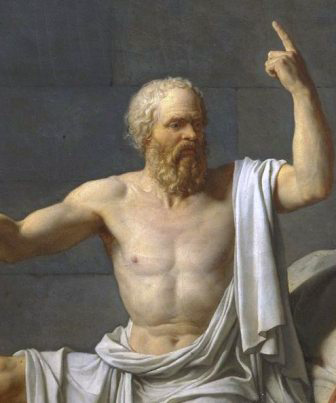
Socrates (469-399 BC) - who, according to the Cassiopaean transcripts was an incarnation of Jesus of Nazareth - was an Athenian philosopher who has often been dubbed the father of western philosophy.
He wrote nothing of his own - at least, nothing that ever survived - so what we know of him, his life and his belief system comes down to us via other philosophers, such as his student, Plato, as well as Zenophon and Aristophanes. He was the son of a sculptor and a midwife and was interested in scientific theories in his youth. He served as a soldier in the military for a time, then later worked as a stonemason. Eventually, the inheritance he received from his father allowed him to focus his time and energies on the area that came to interest him the most - philosophy, particularly that which emphasized ethics; the study of virtue and the nature of good and evil.
He spent the rest of his life teaching the youth of Athens. Unlike the Sophists of the day, he never asked for payment in return for that service, which is testament to the fact that he seems not to have been primarily interested in material gain. His teaching method was unique in that it did not involve simply one person preaching their “great wisdom” to students who never questioned that wisdom. Rather, Socrates’ method involved equal exchange, input and feedback between himself and his students. It involved intense, critical dialogue and discussion between all parties prior to any conclusion being arrived at. Socrates believed that the first step to acquiring true knowledge is to admit our own ignorance. He questioned everything and by way of example, taught others to question and think for themselves. Popular “truths” of the day were critiqued and often found lacking. People who believed they knew “the truth” were often found to be faulty in their reasoning and logic, simply believing something as a truth by mere virtue of the fact that it was a popular opinion. Socrates revealed many of these so-called “truths” as nothing more than opinions or right out lies, and this naturally created enemies for him. Socrates’ love for the truth is something that is shared by those involved in the Cassiopaean experiment. The acquisition of enemies as a result of this has also been something that Socrates and the Cassiopaean experiment have in common.
Ultimately, Socrates - living in a country that prided itself on “democracy” - was executed on charges of corrupting the youth and heresy. He accepted his death sentence, despite being begged to escape by some of his students, and drank the hemlock that killed him in 399 BC.
See also
- Plato
- Atlantis
